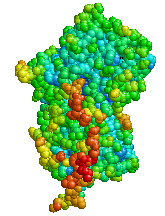
Photo from wikipedia
ABSTRACT Alpha-1 antitrypsin deficiency (AATD) is an autosomal co-dominant disease characterised by low serum levels of this molecule. Its epidemiology remains unknown in many countries, mainly due to its underdiagnosed… Click to show full abstract
ABSTRACT Alpha-1 antitrypsin deficiency (AATD) is an autosomal co-dominant disease characterised by low serum levels of this molecule. Its epidemiology remains unknown in many countries, mainly due to its underdiagnosed state and lack of patients’ registries. We aim to evaluate and characterise a sample of Portuguese individuals tested for AATD, between 2006 and 2015, based on a retrospective analysis from the database of a laboratory offering AATD genetic diagnosis service. 1684 individuals were considered, covering almost every region in Portugal. Genetic diagnosis resulted from requests of clinicians from different areas of expertise, mainly pulmonology (35.5%). Most subjects could be distributed into more common genotypes: MZ (25.4%, n = 427), MS (15.5%, n = 261), SZ (11.2%, n = 188), ZZ (9.4%, n = 158) and SS (5.6%, n = 95). 9.5% of the subjects were found to carry at least one rare deleterious allele, including the recently described PGaia, Q0Oliveira do Douro, Q0Vila Real and a novel SGaia variant. This study comprises 417 subjects (24.7%) with severe to very severe AATD and 761 carriers (45.2%), 22.7% of those identified by familial screening. The present study represents the most complete survey of AATD in Portugal so far and discloses a high rate of severe and very severe deficiency cases, attributed not only to ZZ and SZ genotypes but also to a large number of rare combinations with other null and deficiency alleles. It also uncovers a low awareness to AATD among the medical community, highlighting the need to create a Portuguese national registry and AATD guidelines and increase the awareness about this condition.
Journal Title: COPD: Journal of Chronic Obstructive Pulmonary Disease
Year Published: 2018
Link to full text (if available)
Share on Social Media: Sign Up to like & get
recommendations!